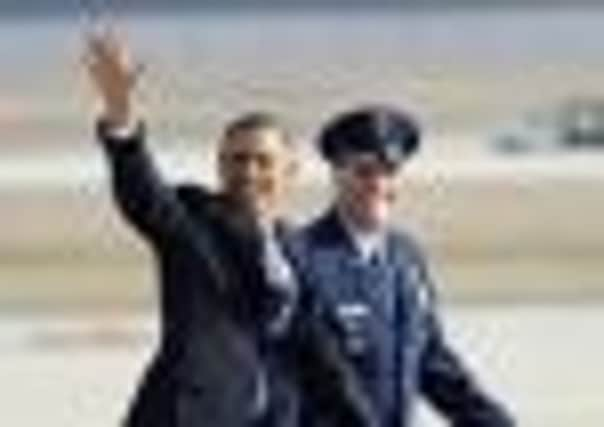Barack Obama takes to road in campaign to push his taxation policy


With only a month until an automatic wave of tax rises and crippling government spending cuts kicks in, and little sign of progress in talks between senior Republicans and Democrats seeking a deal to avoid them, Mr Obama was in Pennsylvania talking to workers at a toy factory.
Although it is Congress, not the public, who will decide this issue, the president believes campaign-style electioneering is the best way to get his message across in an increasingly hostile battle essentially about how to tackle the nation’s burgeoning $16 trillion debt.
Advertisement
Hide AdAdvertisement
Hide AdHe told his audience that the clock was ticking on the opportunity for rival politicians to unite for the benefit of the American people and reach an agreement, which economists, and even the Congressional Budget Office, have warned is essential to prevent the still-fragile US economy plunging back into recession.
“As we move into the holiday season, Democrats and Republicans should come together to renew middle class tax cuts so families have more certainty at this critical time for our econ-omy,” he said.
“If we act quickly, we can prevent a hit to consumer spending which is roughly 70 per cent of the US economy.”
Mr Obama wants an immediate renewal of lower tax rates for the middle class that were adopted during the administration of his predecessor George W Bush. They are due to expire on New Year’s Day.
His plan proposes tax rises instead on those earning more than $250,000 a year and includes a new round of spending to try to stimulate the economy, something senior Republicans oppose.
The Obama plan, acknowledged by White House aides to be the president’s “opening bid”, was outlined by Treasury secretary Timothy Geithner on Thursday and was immediately branded “completely unrealistic” by Mitch McConnell, the Senate minority leader. His Republican party controls the House of Representatives and has blocking power in the Senate.
According to reports, Mr McConnell “burst into laughter” when he learned some of the details of the plan, which he said was one-sided because it dealt almost exclusively with tax issues while being vague on spending cuts.
The publication said Mr McConnell was angered that Mr Obama discussed the reining back of government expenditure on food stamps and social security disability payments when he met congressional leaders days after his 6 November re-election victory, but that Mr Geithner made no mention of them on Thursday, indicating they “appear to be off the table now”.
Advertisement
Hide AdAdvertisement
Hide AdMr Obama has not been directly involved in negotiations since then, with the Republican House speaker John Boehner attacking him for embarking on a “fiscal cliff roadshow” this week featuring talks with business leaders, economic advisers, small business owners and middle class Americans.
The independent Tax Policy Centre predicts that if no deal is reached, the average American family will find itself paying an additional $3,500 in taxes next year, while cuts to government spending will lead to a massive decrease in productivity then recession.